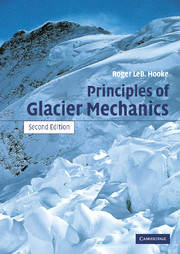Book contents
- Frontmatter
- Contents
- Preface to the first edition
- Preface to the second edition
- Physical constants relevant to ice
- Derived SI units and conversion factors
- 1 Why study glaciers?
- 2 Some basic concepts
- 3 Mass balance
- 4 Flow and fracture of a crystalline material
- 5 The velocity field in a glacier
- 6 Temperature distribution in polar ice sheets
- 7 The coupling between a glacier and its bed
- 8 Water flow in and under glaciers: geomorphic implications
- 9 Stress and deformation
- 10 Stress and velocity distribution in an idealized glacier
- 11 Numerical modeling
- 12 Applications of stress and deformation principles to classical problems
- 13 Finite strain and the origin of foliation
- 14 Response of glaciers to changes in mass balance
- Appendix: Problems
- References
- Index
2 - Some basic concepts
Published online by Cambridge University Press: 24 November 2009
- Frontmatter
- Contents
- Preface to the first edition
- Preface to the second edition
- Physical constants relevant to ice
- Derived SI units and conversion factors
- 1 Why study glaciers?
- 2 Some basic concepts
- 3 Mass balance
- 4 Flow and fracture of a crystalline material
- 5 The velocity field in a glacier
- 6 Temperature distribution in polar ice sheets
- 7 The coupling between a glacier and its bed
- 8 Water flow in and under glaciers: geomorphic implications
- 9 Stress and deformation
- 10 Stress and velocity distribution in an idealized glacier
- 11 Numerical modeling
- 12 Applications of stress and deformation principles to classical problems
- 13 Finite strain and the origin of foliation
- 14 Response of glaciers to changes in mass balance
- Appendix: Problems
- References
- Index
Summary
In this chapter, we will introduce a few basic concepts that will be used frequently throughout this book. First, we review some commonly used classifications of glaciers by shape and thermal characteristics. Then we consider the mathematical formulation of the concept of conservation of mass and, associated with it, the condition of incompressibility. This will appear again in Chapters 6 and 9. Finally, we discuss stress and strain rate, and lay the foundation for understanding the most commonly used flow laws for ice. Although a complete consideration of these latter concepts is deferred to Chapter 9, a modest understanding of them is essential for a fuller appreciation of some fundamental concepts presented in Chapters 4-8.
A note on units and coordinate axes
SI (Système International) units are used in this book. The basic units of length, mass, and time are the meter (m), kilogram (kg), and second (s) (MKS). Temperatures are measured in Kelvins (K) or in the derived unit, degrees Celsius (°C). Some other derived units and useful conversion factors are given on p. ⅹⅶ.
In comparison with the earlier glaciological literature, one of the most significant changes introduced by use of SI units is that from bars to pascals as the principal unit of stress. The bar (= 0.1 MPa ≈ 1 atmosphere) was a convenient unit because stresses in glaciers are typically ∼1 bar.
- Type
- Chapter
- Information
- Principles of Glacier Mechanics , pp. 5 - 16Publisher: Cambridge University PressPrint publication year: 2005



